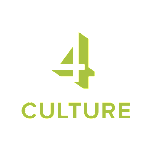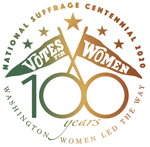-
Women enjoying the "Seeing Seattle" open-air tour c1910
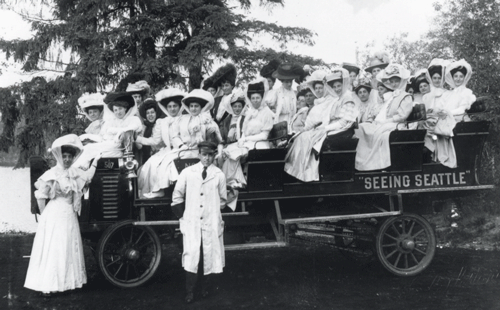
Women seated in "Seeing Seattle" open-air touring vehicle, Seattle, Washington, approximately 1910
Note from donor file: "Seeing Seattle" car, ca. 1910. Blanche Newberger (Stern), 8th from right; Seattle.
University of Washington Libraries, Special Collections/Washington State Jewish Historical Society, JEW0684
-
Wendy Marcus
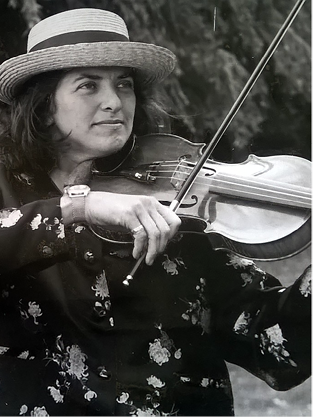
My parents, Stanley and Marianne Marcus, had a bohemian streak that prompted them to hop in a station wagon with my sister, brother, and myself to explore Northwest Washington in the summer of 1967. Shortly thereafter we moved from Northern New Jersey to Bellingham, WA, where I attended Sehome High School, graduating in 1972. Violin in hand (my teacher in Bellingham was the amazing Arthur Thal), I headed for the University of Washington. At the UW, I played in the symphony under the baton of the also amazing Samuel Krachmalnick. These formidable musical leaders, who both happened to be Jewish, sparked my lifelong love of music and performing. It was Seattle trumpeter Peter Lippman who helped me find my Jewish musical home when he introduced me to Klezmer music in the late 1970s. Yossi Stein, of blessed memory, and I formed a duo, The Mazeltones, that later morphed into a band created by Rabbi Jim Mirel and I, also called The Mazltones. For 16 years we rode the Klezmer revival wave an d had tubs of fun at weddings, concerts, and B'nai Mitzvah celebrations everywhere in the West, the East Coast, and Russia. Jim and I still play music, independent of each other.
With KlezKidz, sponsored by Temple Beth Am (where I worked as a teacher and music director for 31 years), clarinetist Shawn Weaver and I guided the next generation of Klezmer musicians.
I feel very lucky that in the world of Jewish music - especially in Seattle - there were no barriers to where and what I could perform. I learned Ladino music to play for Sephardic lifecycle events. I taught Israeli dances to festival attendees in the streets of Anacortes, WA. I sang Yiddish from a barge in Lake union when The Mazeltones performed at Fratelli's Family Fourth, sponsored by KING FM in 1990. Even the Chabadniks hired the band (with a woman in it!) to play for Purim in the University District Chabad House, I knew I was "in" when Rabbi Levitin poured me some vodka to make a "L'Chaim" that evening!
In the '80s and 90's, people were intrigued to be dealing with a young, female, Jewish bandleader. I was super conscientious about treating my community well -- it was work AND it was a mission to preserve a beautiful musical tradition. I also loved dancing and good food and drink, the power of a good party! I whole-heartedly subscribed (and still do) to the Jewish concept of a "shem tov", a good name, and tried my best to be respectful and trustworthy. I did not use contracts until the final years of the band and did so only because society started to change and demanded such paperwork.
Today, I am semi-retired. I still do a little music for virtual services at Temple Beth Am. I teach Yiddish. I teach violin to youngsters, including my granddaughter Marisa. I am tickled and grateful to be a link in the chain of Jewish musical tradition in the Northwest.
In collaboration with the Jewish Women's Archive, the Washington State Jewish Historical Society is proud to announce Agents of Change: Washington Jewish Women's Stories, featuring women telling their SHORT stories in their own words (and must include a photo).
New stories and submissions are being curated and will be added as they are finished. You can submit your story using the link below.
The short stories that will be shared are of women who have made their mark in a wide array of fields. Agents of Change illustrates the many important contributions Jewish women are making every day in Washington state and in our world.
To contribute your story as a Jewish Woman in Washington state, click the form link below to submit your information. You can also submit an audio recording using the voice memo recording feature on your mobile device.
Please note that your "story" should be no more than about 2 paragraphs or under 3 minutes in the recording. We are not looking for your life story, but instead a statement about what is meaningful to you, what you have accomplished, what you feel is significant to you or your family or the community. Again, NOT your life story here.
We also MUST have a visual submission with this - a photo of you or something related to your submission. If you have problems with any of this, please contact Sara Mottaz at saram@wsjhs.org
-

Note that these prompts are ONLY suggestions and you might only answer one or two of them in your SHORT story submission. You will not have time to answer all of these.
- How did you or your family come to live in Washington State? What has your experience been like here?
- Please describe a time in your life when you took a risk or had a powerful experience and challenged yourself. What did you learn from this experience?
- What barriers have you faced, if any, and how have they made you feel?
- Could you share a time in your life when being a Jewish woman was particularly meaningful or particularly challenging? How does Jewish wisdom, practice, or identity show up for you today?
- Is there anything I haven’t asked about that you would like to share?
-

Agents of Change are remarkable Jewish women of Washington State who have made their mark, created change, and inspired others. Are you a Jewish woman from Washington State who broke a barrier, stood up to lead, went above and beyond, or achieved something great? If so, share your story with us. You can also interview an Agent of Change and share her story.
- Nominee must identify as a Jewish woman
- She can be a contemporary or historical figure
- She must represent a significant achievement
- While nominees do not have to have been born in or currently live in Washington State, the majority of the work or the achievement for which she is being recognized must have been completed in Washington State
- Her work or achievement should exemplify Jewish values
- Nominations will be accepted through July 2020
- Submissions should be brief and concise
- A photo must be included with the submission
- Permission must be granted for materials to be used on WSJHS website, Washington Jewish Museum, social media, physical exhibits/publication
-

All submissions must include a visual element that is relevant to your submission and high resolution.
Photos will ideally be a portrait, or similar, of the subject of your submission but can also be of something related to the story including pictures of an important location, group of people, building, document, or landmark. You must have permission to share the photo because submitting your story and photo gives the WSJHS and JWA permission to use the materials.
Questions can be submitted by email to Sara by clicking here.
-

Examples of Jewish women in Washington state include but are not limited to these type of contributions (and can be in the present tense or the past.) Feel free to also submit for your relatives living or deceased. Please remember, these are short stories, not life biographies.
- You are a leader in a Jewish organization or any business or organization
- You are a volunteer in any nonprofit
- You are an advocate for your child in the school system
- You volunteered for the JFS food bank once a week for years
- You helped access the health care system for a relative or yourself
- You were a first in any position as a woman or a founder
- You had a small idea and it turned into something amazing
- You write a blog about something you care deeply about
- You believe in any cause and wish to share this
- You have gone through struggles in some aspect of your life and you story should be shared.
Additional examples will be added here as we think of them and as they are received.
When in doubt, you probably belong to this group of amazing women and you should submit your story.
Questions should be addressed to Sara Mottaz at this link.
-

When recording your story, if using the voice memo app on your phone, it should be no more than five minutes in length, use the the story prompts provided below as a starting point and feel to provide additional information answering an unasked question. Choose what is meaningful or of interest to you. Submissions should be brief and concise and must include a photo.
When beginning, first clearly state and also spell your name. If you are interviewing someone else, then state and spell both your, and the narrator’s names.* Listen attentively and ask follow-up questions as you go allowing brief pauses between questions and answers.
*If you are sharing someone’s story who could not be present for the interview, feel free to answer these questions based on your conversations with her or from your point of view as someone who was impacted by her experience.
Again, this is not the place for a life biography, but instead a short statement about your work or passion.
Agents of Change Stories
-
Cindy Coopersmith
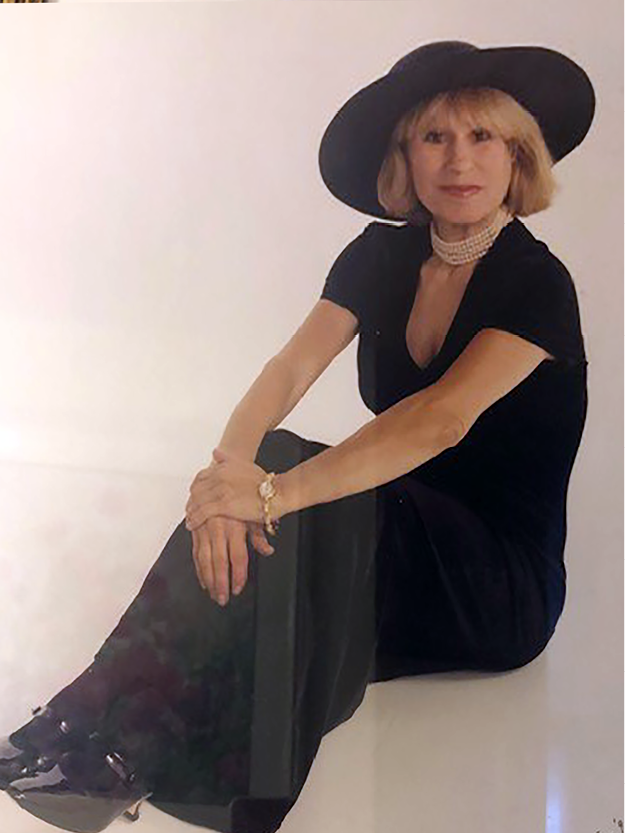
I moved from New York in1997 - just under 23 years ago because my children and grandchildren moved To Washington state coincidentally of each other for their careers. I decided on moving to Olympia, WA. Because I was interested in the political scene. From the time I met Eleanor Roosevelt when I was a high school student in New York City, I have been interested in politics. When I turned 21( the age one could vote in 1958) I registered to vote because I considered it was my Civic duty to do so and I have voted in every single election since then. I majored in education and minored in political science in college and became a teacher and a stay at home mom when I had my three children.
I returned to school, earning a graduate degree in clinical psychology and following that, a second masters degree in Social Work. At that time , I became interested in women’s issues becoming an advocate for women. Invited to the Massachusetts state legislative committee, I then linked the legislators in Boston to the legislators in New York and attended meetings in both committees for several years. I was invited to a number of tv and radio programs during that time. In Olympia, I became involved in the tour guide program, giving tours to school groups , mayors of wa. State towns, consuls from foreign countries and some prominent visitors to the state capital. I became immersed in Washington state history and met with legislators, justices and several governors. I also gave mock oral arguments often in the Supreme Court when the justices were not in session, seeking out interesting court cases. I was a member of the Washington state Lewis and Clark state committee and was involved in planning a number of events commemorating the expedition’s 200 years. I was also involved in the state archives , condensing governors records from statehood to 1940 and they are online to this day. I portrayed Susan B Anthony in the Olympia parade honoring the women suffragists riding in an antique automobile and waving to onlookers.
Six years ago, I moved to Bellevue to be closer to family I discovered the senior telos program in Bellevue at Bellevue college and began taking classes in a variety of subjects,drawing and painting and classes on the US presidents and the us constitution. I attend the constitution club weekly-online now and am a founding member. We discuss issues pertinent to the constitution, the Supreme Court and the presidency as well as the founding fathers ideas about our republic and our form of government. Several years ago , I visited family members in Tel Aviv and Jerusalem and the Mount of Olives where several generations of my forbears are buried. I was deeply moved. They were rabbinical scholars and I think about Judaism and what it means time. Education , learning ,ethics and morality and I am influenced by these scholars. I had always wanted to have a salon where writers, artists,musicians , philosophers and politicians would come together to discuss the issues of the day. I now see where my thoughts and ideas were generated - it’s in the genes. I do however have my salon within the thinkers of my own family.
-
Joani Diskin Saran
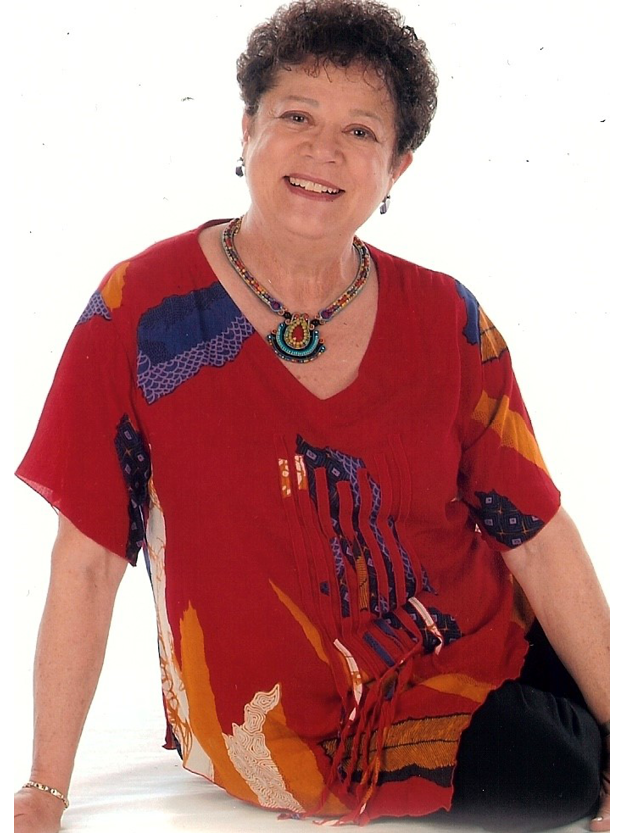
This is Joani Diskin Saran. I grew up and spent most of my adult years in Spokane, Washington. We were a small Jewish community of about 200 families, but the largest community between Seattle and Minneapolis. I often represented the Jewish community at speaking events and panels in the larger Spokane community. I was on a panel of women from different religious areas of the community. As we were waiting for the program to begin the woman next to me said, "You better take off your hat." (Those were the days of dressing up with hats and gloves, etc.) Being the naive, small-town girl I was, I didn't understand what she meant. She continued, "Most of these people here today have never seen a Jewish person. They are going to think you are wearing the hat to cover your horns!" Off came that hat!
-
Geri Dube
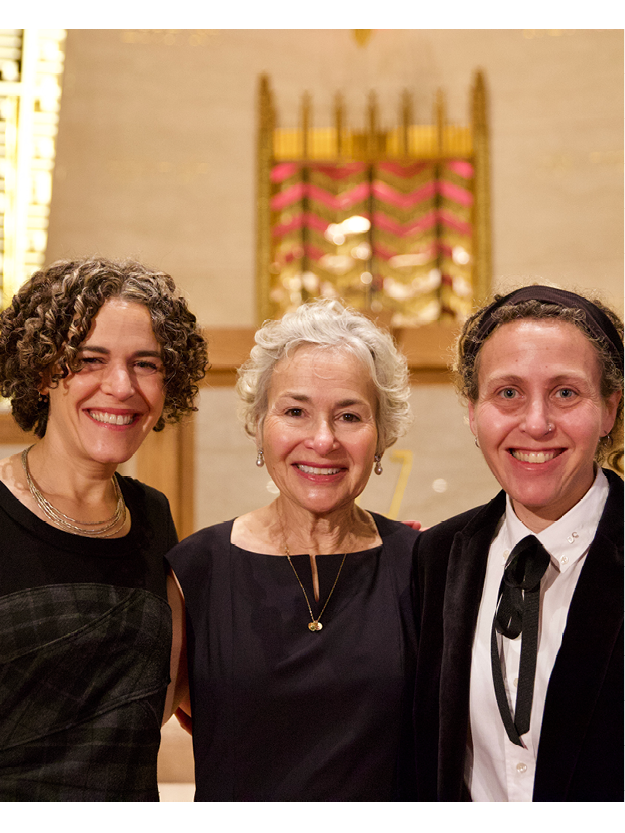
Interview, available further down the page, of Geri Dube conducted by her daughters Ilana Cone Kennedy and Dani Cone.
Photo: Geri Dube (center) with Ilana (left) and Dani (right) at Geri's grandson's (Ilana's son's) Bar Mitzvah, October 2019, TDHS Seattle.
-
Allison Flash
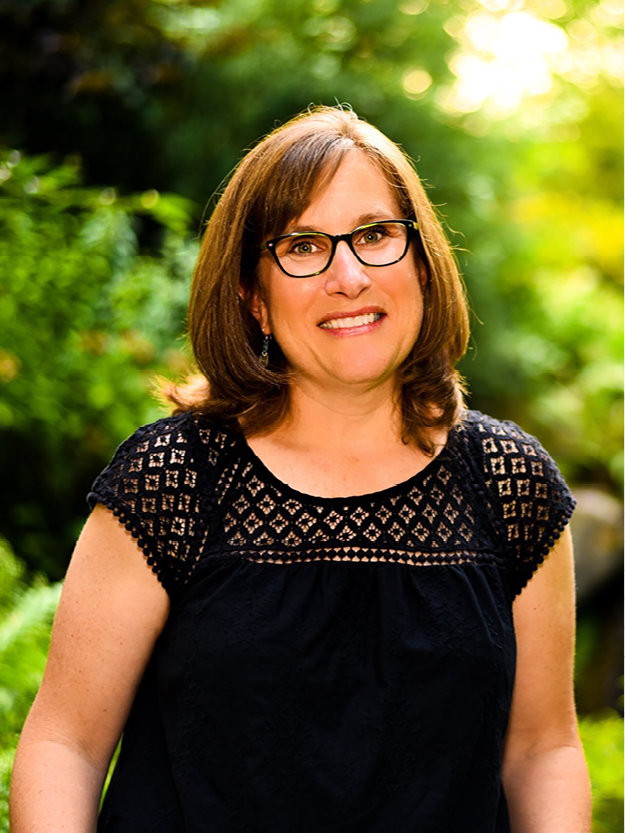
My name is Rabbi Allison Flash and my family moved to Washington State in 2006. Although my husband grew up here, we had not lived here as a family until then. In addition to being a rabbi, I am a mother of three children, all products of public schools. After several years of struggling when our religious observances conflicted with school calendars, I decided to do something about it. I was tired of children in minority faiths constantly needing to choose between their cultural observances and activities at school such as field trips, yearbook pictures, curriculum nights, parent-teacher conferences, and exams. Many of these activities needed to be missed to observe Jewish holidays; exams needed to be made up at times that necessitated the students missing other activities. I was tired of watching as students in minority faiths were made to feel less than their peers when they were unable to fully participate in school activities. They were being taught their faith and their traditions did not matter and I feared they were being taught they did not matter. This was not a Jewish issue. It was not a Muslim issue or a Hindu issue but rather an issue of equity for all students.
Deciding it was time to make a change in Washington and to fight for educational equity for all students of faith, I became involved in many reforms and have worked with a number of school districts to help them become more culturally aware and inclusive. I organized interfaith clergy and leaders from around the state to petition the Office of the Superintendent of Public Instruction to make schools more culturally sensitive when scheduling school events. Working with the Jewish Federation of Greater Seattle, I met with the Superintendent of Public Instruction and worked with his office to create a calendar of interfaith holidays. We distributed them to school districts around the state with the expectation that holy days be considered when creating district calendars. I worked with school districts who were scheduled to open kindergarten classes on Rosh Hashanah and was able to convince three of the four to alter their calendar so as not to conflict with the holiday. In addition, I helped in the efforts to have Governor Inslee sign into law a bill requiring institutions of higher education to give reasonable accommodations to students of faith when their religious observances conflict with academic requirements such as exam schedules.
My hope is that I have made a difference in our schools and for our students. The work is definitely not done nor am I!
-
Cindy Linkon
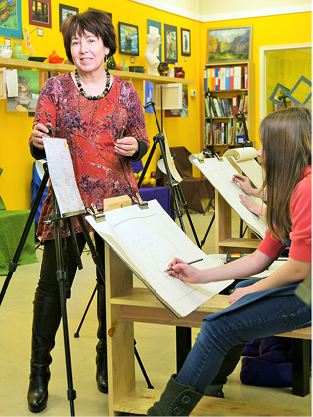
My name is Cindy Linkon and I am a huge supporter of the arts in all forms, especially in the schools. When I was a student in elementary school, I gravitated to drawing and painting. When drawing in school, the projects helped me develop creative problem - solving skills. The success I felt after completing my art, I believed I could accomplish anything.
Today, in most schools, the arts continue to decline due to shortage of money. To preserve money in schools, the art curriculum is the first to go. I do not vie any subject in school to be more important than any other, but without art integration in schools, our children suffer.Every student learns differently. The visual learner can be stimulated visually through the arts which will help the student understand concepts easily or the student who lacks fine motor skills can develop these skills while creating an art project. The arts do not only develop a child’s creativity, but it improves their academic performance.
I was fortunate to grow up with the arts in school, but our children today, are missing great learning opportunities.
When I moved to Bellevue Washington with my family in 2006, I made it my mission to open fine art studios to bring back the arts in my community.Today, I feel proud that children have a place to be creative, build confidence, develop decision making skills, focus, develop fine motor skills, and feel successful. Young adults who want to work in the field of the arts now have a place to learn the basics of fine art without feeling intimidated or embarrassed that they did not learn these skills in school. Older adults who always wanted to be an artist, have a place to attend and reach their goals.
I know my work is done when I have made a difference in people’s lives.
-
Wendy Marcus

My parents, Stanley and Marianne Marcus, had a bohemian streak that prompted them to hop in a station wagon with my sister, brother, and myself to explore Northwest Washington in the summer of 1967. Shortly thereafter we moved from Northern New Jersey to Bellingham, WA, where I attended Sehome High School, graduating in 1972. Violin in hand (my teacher in Bellingham was the amazing Arthur Thal), I headed for the University of Washington. At the UW, I played in the symphony under the baton of the also amazing Samuel Krachmalnick. These formidable musical leaders, who both happened to be Jewish, sparked my lifelong love of music and performing. It was Seattle trumpeter Peter Lippman who helped me find my Jewish musical home when he introduced me to Klezmer music in the late 1970s. Yossi Stein, of blessed memory, and I formed a duo, The Mazeltones, that later morphed into a band created by Rabbi Jim Mirel and I, also called The Mazltones. For 16 years we rode the Klezmer revival wave an d had tubs of fun at weddings, concerts, and B'nai Mitzvah celebrations everywhere in the West, the East Coast, and Russia. Jim and I still play music, independent of each other.
With KlezKidz, sponsored by Temple Beth Am (where I worked as a teacher and music director for 31 years), clarinetist Shawn Weaver and I guided the next generation of Klezmer musicians.
I feel very lucky that in the world of Jewish music - especially in Seattle - there were no barriers to where and what I could perform. I learned Ladino music to play for Sephardic lifecycle events. I taught Israeli dances to festival attendees in the streets of Anacortes, WA. I sang Yiddish from a barge in Lake union when The Mazeltones performed at Fratelli's Family Fourth, sponsored by KING FM in 1990. Even the Chabadniks hired the band (with a woman in it!) to play for Purim in the University District Chabad House, I knew I was "in" when Rabbi Levitin poured me some vodka to make a "L'Chaim" that evening!
In the '80s and 90's, people were intrigued to be dealing with a young, female, Jewish bandleader. I was super conscientious about treating my community well -- it was work AND it was a mission to preserve a beautiful musical tradition. I also loved dancing and good food and drink, the power of a good party! I whole-heartedly subscribed (and still do) to the Jewish concept of a "shem tov", a good name, and tried my best to be respectful and trustworthy. I did not use contracts until the final years of the band and did so only because society started to change and demanded such paperwork.
Today, I am semi-retired. I still do a little music for virtual services at Temple Beth Am. I teach Yiddish. I teach violin to youngsters, including my granddaughter Marisa. I am tickled and grateful to be a link in the chain of Jewish musical tradition in the Northwest. -
Linda Morgan
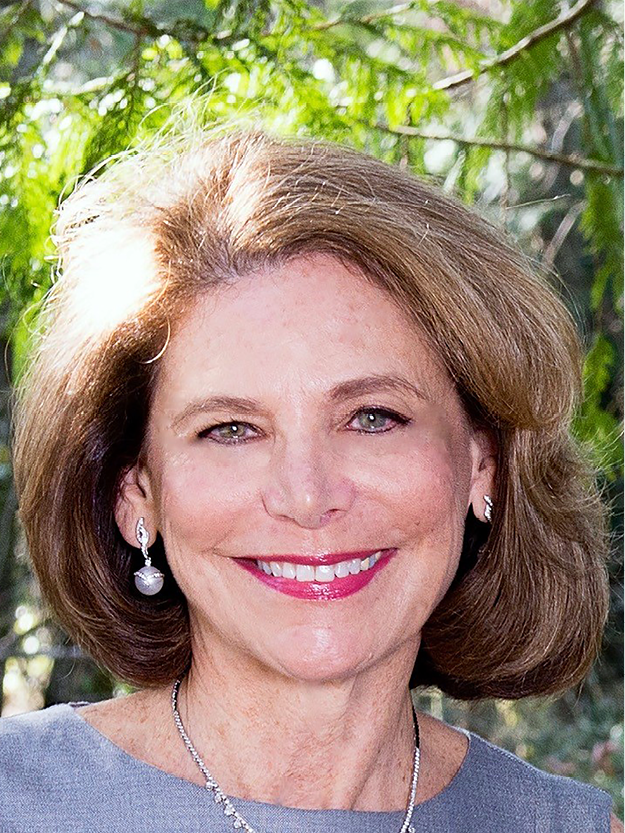
Listen to Linda Morgan's story further down this page.
-
Paula Podemski
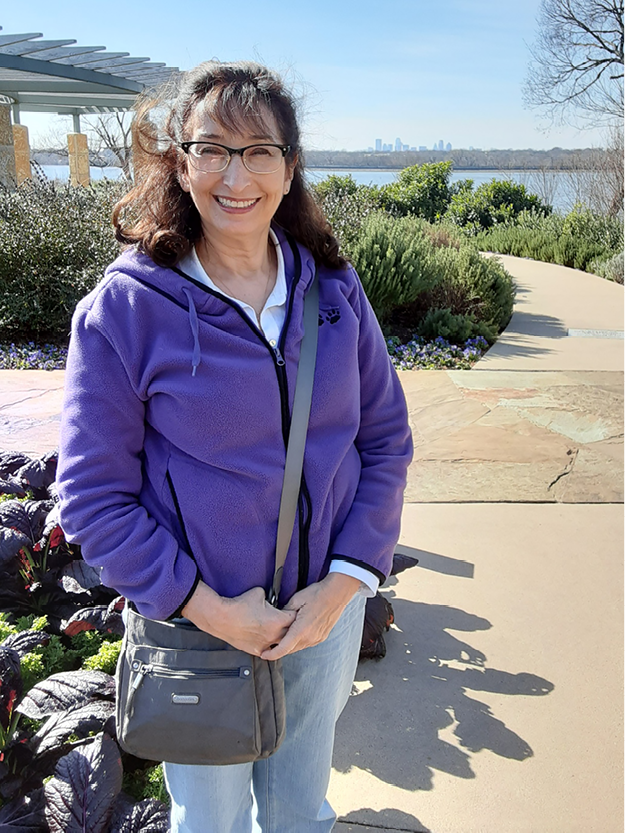
I am the only one in my immediate family born in the US and my dad wanted me to have an American name. Even after losing so many family in the Holocaust, I was not to be named after someone the way my brother and and sister were. My parents were going to name me "Carmen" or "Maxine" (my dad's name was Max). At the time, my dad was working as a tailor in a men's clothing store in Portland Oregon, The Clothes Horse. While my mom was pregnant with me and they were discussing names, fortunately the wife of the owner said, "why don't you name her Paula, it's such a pretty name" and thank God it stuck. I would either be Carmen Podemski or Maxine Podemski. Both not great. However I would have preferred to be named after one of the four siblings my dad lost in the war.
-
Janet Poppers-Hanrahan

Moving to Bainbridge Island in 1977, from an active Jewish life in San Diego, was extremely traumatic in that I felt I was leaving my Jewish identity in Southern California and moving to a Christian location, with churches on many corners. I had young children and just sort of vegged while husband was involved in a productive and rewarding career involved in opening the Bangor Submarine Base. It was when my two elementary age daughters came home from school one day and said they were told they were going to hell because they didn't think of Jesus as G-d, I knew I had to take action. While shopping for Channukah supplies at Temple De Hirsch in Seattle I started to shmoose with a woman who said she also lived on Bainbridge so I immediately asked her to come to our house for latkes on Channukah. She said she knew of another Jewish family on the Island and asked if they could be invited too. I said, of course, and the result was 71 Jewish attendees in my home for my latke party. My father had made a large wooden Star of David for me when I was a child, which was covered in blue lights, and I had hung in my front window. Many people were in tears when I welcomed them in because they were so moved by the Magen David as they walked down our long driveway in the evening. When my daughters recognized another Jewish child from their school my heart swelled. A Chavurah was formed and today we have TWO Jewish communities on the Island, Congregation Kol Shalom and Shir Hayam. It is good to be Jewish on a beautiful island in the middle of Puget Sound.
-
Heather Umbehocker Price
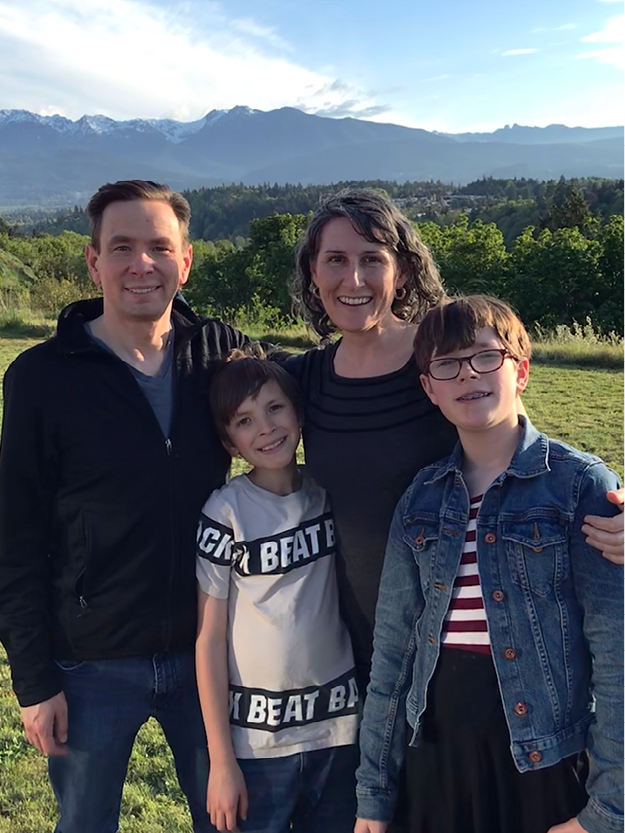
She has conducted research and teaching in climate science for over 20 years. It is with great pride that I speak about my daughter, Heather Umbehocker Price, Phd. Chemistry Professor at North Seattle College. Heather teaches her children and students to be activists for Climate Change as well as speaking out at rallys for Black Lives Matter. She believes in leaving the environment clean and a more equitable future for our children. Tikkum Olam, Reparing the World, is Jewish wisdom that she believes in and models everyday. Heather has spoken about Jewish people who are also activits, children and adults, who have written books and started their own non-profits to help mitigate Climate Change. Her Jewish community inspires her to continue her speeches and writings for replacing fossil fuels with renewable energy like wind and solar.
- Carol Umbehocker
-
Goldie Silverman
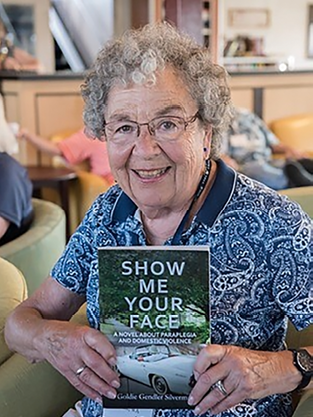
My husband and I are of a generation when all the young men were drafted into the military. As a doctor, Don had been deferred to finish his education (in Nebraska), but when he finished his internship (in Portland OR) he was assigned to the navy and we were sent to Seattle. We intended to move back to Portland, some time, but never got around to it.
Life interfered.
Early in the 1980s I accompanied my husband to a meeting of the American Academy of Physical Medicine and Rehabilitation in Baltimore. I knew a lot about Don's work, because I'd been attending lots of meetings with him, and he liked to talk about his work, but one day in Baltimore I struck out for some sight‐seeing on my own. When I came back, I went to the convention center to look for him. Late in the day, the dim lobby was deserted. A tall escalator was running silently toward a destination near the ceiling. As I waited there, wondering what to do next, a lone wheelchair rolled out from the shadows on the other side of the lobby and headed toward the escalator. If he saw me, the man in the chair gave no sign of recognition. He rolled up to the foot of the escalator, put both arms out to grasp the handrails, and pulled himself up on to the moving stair. I watched in amazement as he rode up to the top and then rolled out of sight. What kind of man, I thought, would attempt such a daring feat? He must be some kind of superman, superior in every way except that he could not walk. What kind of relationship would/could a woman have with such a gorgeous man? In that moment an idea for a novel was born. I had been writing for many years, all non‐fiction, but like many other writers I thought I would write a novel some day. I decided right then in that dark lobby in Baltimore that I would write about such a man. The idea lived in my head for many years, until 2015, when SHOW ME YOUR FACE, A Novel About Paraplegia and Domestic Violence was born.
If there were barriers, I no longer remember them. Being a Jewish woman is now so much a part of my identity that I no longer think about it. I gave many years to Jewish organizations, but the last major volunteer position I held was as a volunteer for New Beginnings, an agency that supports abused women. I took the job in order to collect information for SHOW ME YOUR FACE, for just one year, but I was so caught up in the work, so well treated as a volunteer, that I ended up spending almost 20 years working there! What I did, to save a life, was very much in accord with Jewish values. I still support New Beginnings every year at GiveBig and attend all their fund raisers.
-
Esther Lott
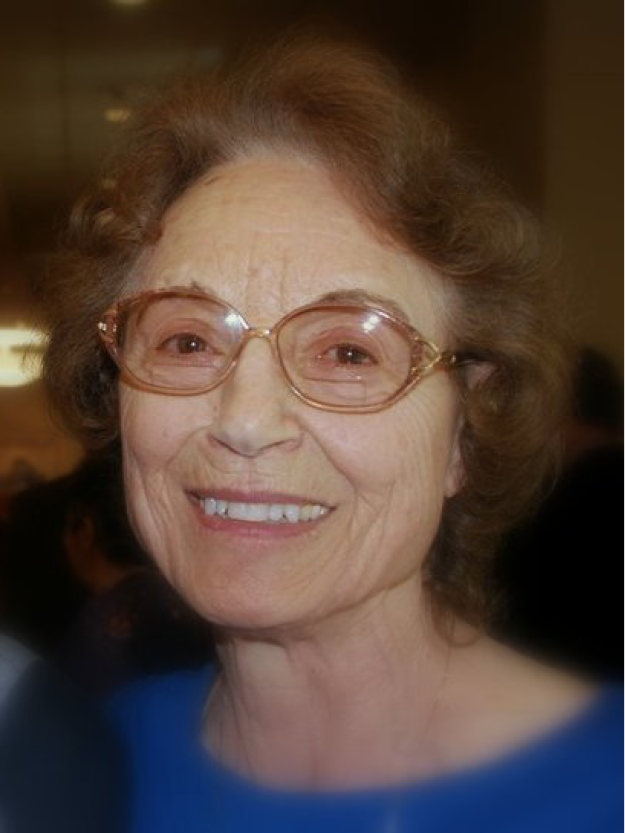
Esther grew up the eldest of seven children to Susan (Azose) (z”l) and Avner Angel (z”l). Their family belonged to and were active members of Ezra Besaroth. As an observant Sephardic family, they attended Kaal (synagogue) regularly, celebrated all the festivals as a large family unit, and kept a kosher home.
In 1955, Esther married Al Lott (z”l) at Ezra Besaroth; and later joined Sephardic Bikur Holim, maintaining connections with the Sephardic orthodox community. When Al’s mother died in 1961, they joined Herzl so Al could say kaddish with his family. Esther & Al remain active members of what is now Herzl-Ner Tamid.
In the early 1980’s, then Cantor at Herzl-Ner Tamid, Errol Helfman, offered a Torah reading class. Esther, a long-time member of HNT’s choir, thought this might be an interesting challenge and took the course with Al. There were eight people that took this class; the first to teach women Torah troupe, and the very beginning of women being allowed to read from the Torah during Shabbat services at Herzl-Ner Tamid.
Esther read Torah at her granddaughter’s Bat Mitzvah, and continues to read Torah to this day-- something her parents could never have imagined.
- Sue Solomon, daughter of Esther Lott
-
Helene Rogers Waldbaum Sprincin
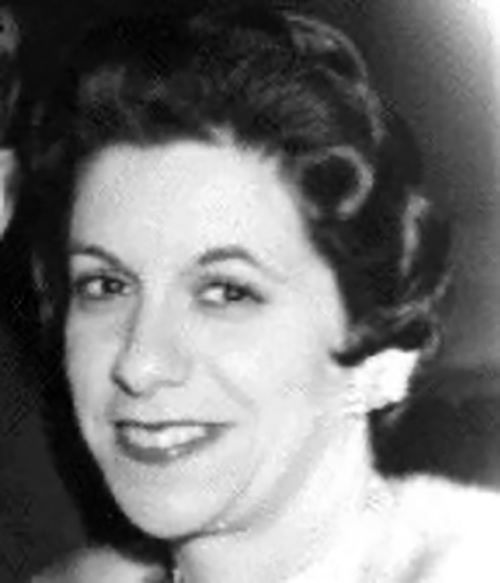
When she was 38, Helene Rogers Waldbaum Sprincin became the matriarch of the Rogers, Waldbaum and Prottas families, when her mother Emma Prottas Rogers died. The eldest of the nine children of Harold and Emma Rogers, she kept the entire family together until her passing more than 37 years later.
Around 1950, she founded Direct Buying Service, Seattle's first complete discount house, and broke retail stores' fixed price barriers. Before Sidney Jaffe founded JAFCO he met with Helene who counseled him how to do it. An active lifelong member of Temple De Hirsch Sinai and its sisterhood, Hadassah, and in 1991 was the recipient of Brandeis University National Women's Committee's Elsa Levinson award.
-
KCJ Szwedzinski
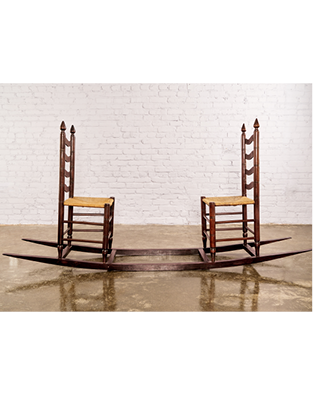
How did you or your family come to live in Washington State? What has your experience been like here?
I moved to Washington state in November of this past year. I graduated from the University of Louisville in May of 2019 with a Master of Fine Arts with a focus on glass and sculpture. My partner is also a glass artist and has lived out here for 25 years, I moved here to be with him and to pursue work in the glass community.
Describe a time in your life when you took a risk or had a powerful experience and challenged yourself. What did you learn from this experience?
Fifteen years ago, I went to rehab after being addicted to opiates for five years. It was one of the scariest things I ever did to walk into the rehab facility and have to face up to all of the things I perceived to be the worst about myself. Fifteen years on, it was the best thing I ever did. Writing this while in quarantine, so many memories from my days in active addiction have come back to me. The experience of addiction and recovery taught me so many things; mostly, that we are more resilient that you can ever imagine, persistence and discipline will carry you farther than you think, and that loving yourself isn’t always pretty but always worth it.
Could you share a time in your life when being a Jewish woman was particularly meaningful or particularly challenging? How does Jewish wisdom, practice, or identity show up for you today?
Growing up, my experiences identifying as Jewish were limited. My grandparents who lived in South Florida were Jewish and I figured that’s where all Jewish grandparents lived. When my mom and dad got divorced and we went to live with my grandparents, I went to a Jewish Academy simply because the only other school in the district didn’t have recess and my mom wouldn’t stand for that. So, I found myself at Donna Klein Jewish Academy spending half of my day learning Hebrew and about Judaism. For a long time that and inconsistently attending services on High Holy holidays was the extent to which I identified as Jewish. When I attended graduate school, I was interested in the idea of inherited legacy, mostly thinking about addiction and intergenerational trauma. I decided I did not want to make work about addiction or mental health and my research lead me to other types of shared generational trauma. I took a class, Literature of the Holocaust, and from there embarked on a three-year course of study into my Jewish heritage. The research ranged from the Shoah; thinking about how narrative changes across time and the ways we witness history to attempts to address sexism in Rabbinical literature. My thesis, Trace, positioned the artist as Ba’alei Kushiah, or question bearer, in an attempt to make the invisible visible and to create moments for the viewer to think in new and different ways. The biggest things I took away from my research regarding Jewish wisdom, practice, and identity: first, that the practice of Midrash in the Jewish commentaries is a uniquely Jewish phenomenon within religions and a methodology that’s relevant for contemporary times. We live, now more than ever, in a polarized and divided nation with little tolerance for difference. Midrash, the practice of debate and argumentation, is dependent on difference. Without two opposing views with which to volley dialogue, new and innovative ideas are impossible. This method of conflict is dependent on a cooperative argumentation where respect for the other is inherent. I feel a lot can be learned from this in regards to the way we interact with people who have different opinions from us. Secondly, The “Jewish identity” is amorphous and defies easy categorization. One can be Jewish in any number of ways; you can be Jewish by birthright, or Jewish by nationality, or by choice. Judaism can be religious, secular, or cultural and manifests differently across the globe. Jews have both assimilated and maintained orthodoxy and are all still “Jewish.” Through my research, I have learned that life is made up of shades of grey and also sharp contrasts, and that reality is ok; as the Talmud says, “both these and these are the words of the living God.”
-
Joyce Rosen Dickhaut

I am writing this about a woman I admire, my sister Joyce Rosen Dickhaut. The challenges she overcame were not immigration or poverty, but the barriers of growing up Jewish in Seattle in the 40's and 50's. It was assumed at that time that if you were a "nice-Jewish-girl" you would live at home until you got married (G-d forbid it should be after 22 years of age) to a "nice-Jewish-boy" and have a family and live happily ever after. If you went to college it was not for an education to start a career, but to find a husband. My sister did that but her marriage ended after she started raising her family (a girl and a boy). She admits she should have ended it sooner but the timing wasn't right. Being a single mother without a formal college education she was faced with trying to find a job to be able to afford to continue to give her children a solid foundation for growing up. In those days there wasn't someone you could pattern your life aft er because Jewish divorces were rare. She finally got a job as a secretary working for the city of Seattle and eventually worked her way up to Fleet Manager for the city and King County.
I have always admired the path she took despite the controversy that she overcame. She wasn't ostracized from the community but I think her friends were envious of her strength as I am.
-
Joanne Schwartz

My father (Dr.Boris Schuster, wife Helen) was in the Navy during World War II and ended up being stationed in Seattle. While he was overseas my mother stayed in Seattle (with my deceased older brother Dr. Joseph Schuster) and I was born and grew up there. After the war, my father and mother, having fallen in love with Seattle, stayed there. In 1962 I married into one of the few Jewish families in Chehalis, WA (Nathan and Esther (Topp) Schwartz) and my husband Harold and I moved here in 1963. Harold (now deceased) taught English for 29 years in the high school from which he graduated. I still live in Chehalis; my two sons David and Mychal and their families live in Seattle/Mercer Island, and my daughter Robin Davis and her husband live in Boise, ID. In 1979 I went to work at St. Helen Hospital in Chehalis managing both the hospital's volunteer and their marketing and public relations programs. I had no experience doing any of those things but the hospital administrator who hired me obviously had faith in me (pun intended as she was a nun and it was a Catholic hospital). I worked there for a year and was subsequently recruited by the hospital administrator at Centralia General Hospital in our neighboring city to provide the same services. I went from a Catholic hospital to a very conservative Christian based hospital and I was well aware that the hospital's administrator took a great deal of criticism from some people for hiring someone Jewish. I'm grateful it didn't stop him nor did it stop me. I've always been very proud and outspoken about being Jewish. During those years I was very active in the community and was one of the founding members of the Lewis County Economic Development Council, and among other things, chair elect of the Centralia Chamber of Commerce. In 1984 I decided to run for Lewis County Commissioner, a position that had never been held by a woman let alone a Jewish woman. Several people with whom I spoke to about it said I'd never get elected because I was a woman, I was Jewish, and 'it's Lewis County.' I was elected twice (4 year terms each) and then decided not to run for a third term. I went to work for the city of Chehalis running a major department (Community Services/Economic Development) for 17 years and ultimately retired in 2009. During that time, along with one of the Chehalis City Councilors, we started The Chehalis Foundation. The foundation was started primarily to raise money for things the city couldn't afford to do (e.g. restore a run-down park) but eventually the foundation's mission expanded to include the community at large and education. The foundation is now a multi-million dollar organization and I still serve on its board. I also served for 22 years on Providence Centralia Hosptial's Community Board (previously Centralia General Hospital) and recently finished two five-year governor appointed terms on Centralia College's Board of Trustees.
The biggest barrier I faced was being told I would never get elected county commissioner. I knew there were people who wouldn't vote for me because I was a woman, a Jewish woman at that but that didn't stop me!
I have always been very outspoken (in a good way) about being Jewish in what is a non-Jewish world. It was quite a cultural shock to move from Seattle where my whole social life revolved around Temple De Hirsch and all my parent's friends were Jewish. I discovered a whole 'other' world. For many years I was the spokesperson for the Jewish Community and was often asked to speak at churches and other organizations about Judaism and being Jewish. I have always been very proud of who and what I am and never shied away from questions or comments. During my years as a county commissioner I traveled all over the county (which is very rural in many parts) and met and interacted with people who had never met anyone Jewish. I believe that my being here and being so active and involved helped overcome some negative ideas and misconceptions about Jews. It also helped that my in-laws and brother-in-law Ken had a men's clothing store in Chehalis and were well known and respected also.
I've been blessed to have received some very significant and meaningful awards and honors over the years including the 2018 Washington State Association of College Trustees (ACT) Trustee of the Year Leadership Award. Another one was in 2014, when I was the Grand Marshall of Chehalis's annual Santa Parade. I've always said there probably aren't too many Jews who are the grand marshal of a Christmas/Santa Parade at least not in small town like Chehalis! When I moved here as a very young bride, I could never have imagined the adventure my life would take me on living here. I will always be grateful to my husband for bringing here and to my beloved in-laws for their loving support.
Funding for Highlighting our Jewish Women in Washington State through the Washington Jewish Museum was made possible, in part, by the 4Culture Sustaining Support Grant, the Women's Endowment Fund of the Jewish Federation of Greater Seattle, and the Washington State Women’s Commission and the Washington State Historical Society through the Votes for Women Centennial Grant Program.
Washington State Jewish Historical Society is dedicated to discovering, preserving, and disseminating the history of the Jews of Washington state and promotes interest in and knowledge of the life, history, and culture of the Jewish people and communities through publications, exhibits, displays, speakers, tours, and performance.
Jewish Women’s Archive is a national organization dedicated to collecting and promoting the extraordinary stories of Jewish women. JWA explores the past as a framework for understanding the issues important to women today; inspires young people with remarkable role models; and uses Jewish women’s stories to excite people to see themselves as agents of change. For more information, please visit www.jwa.org.
